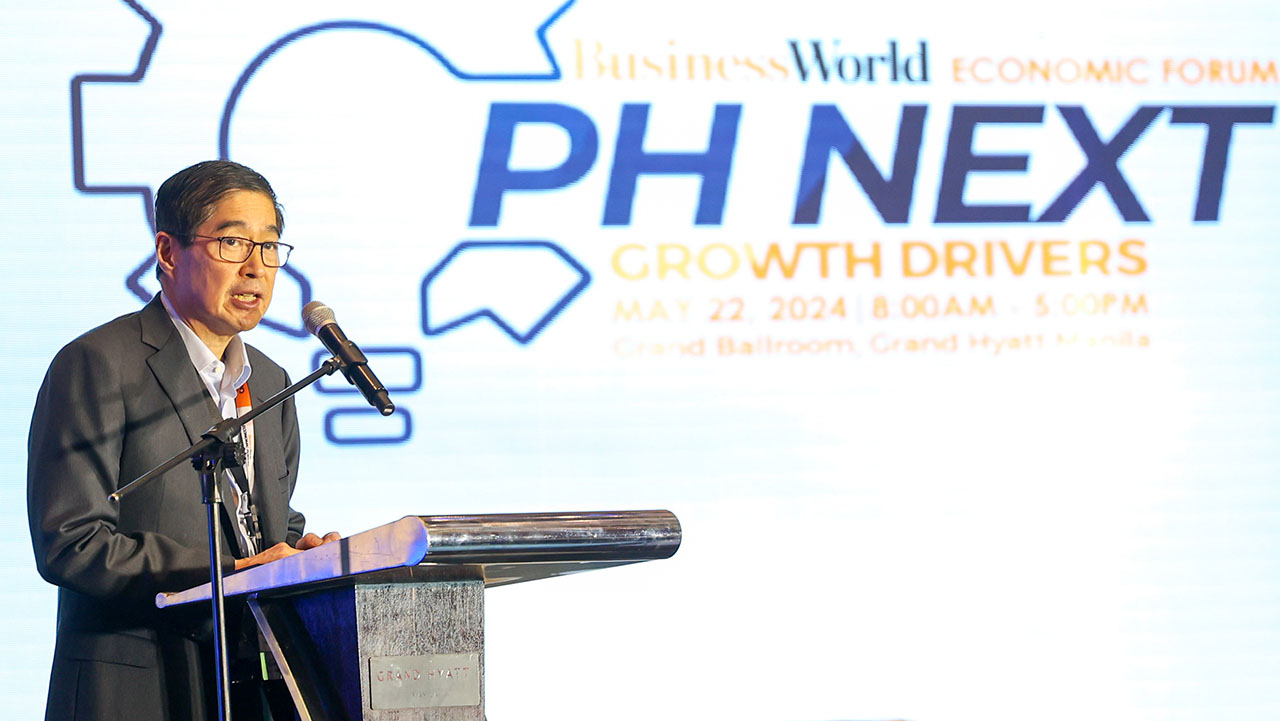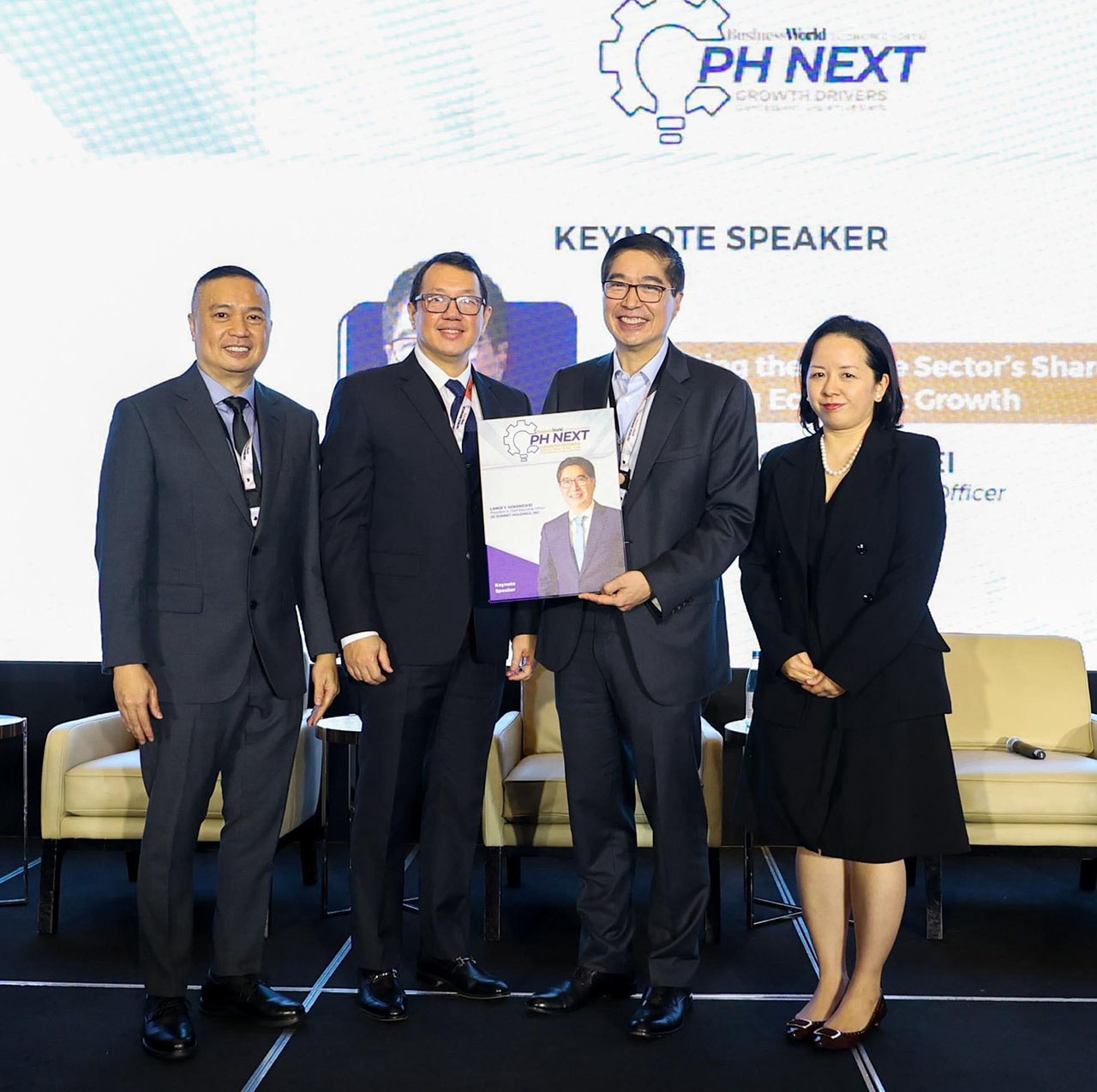In his keynote speech at the BusinessWorld Economic Forum held on May 22, 2024, at the Grand Hyatt Hotel Manila, Lance Gokongwei, president and CEO of JG Summit and head of the Gokongwei Group, put forth the question on everyone’s minds – “Where do we begin?” – encapsulating the daunting task of revitalizing the Philippine economy.
The task of nation building is a humongous challenge. It is not a straight and easy path. It requires planning, cooperation, sacrifice, grit, and unity.
To answer, Gokongwei began by underscoring the Philippines' inherent strengths, the solid foundations on which a sound, feasible, and sustainable economic masterplan could be built upon. He noted that geographically, the country is strategically positioned in a dynamic Asia Pacific region, making it an attractive base for business expansion. The Philippines' natural beauty and vibrant culture also make it an ideal tourist destination, a sector with immense growth potential. While demographically, the nation boasts a young, educated, and talented workforce with a median age of 25, ready to drive future economic activities.
A Promising Economic Landscape
The Philippines is recognized as one of the best-performing economies in the Asia-Pacific region. Despite numerous challenges, the economy is projected to grow, driven by robust consumer spending and increasing urban household incomes. Gokongwei emphasized, “Our growth trajectory is promising despite anticipated external headwinds. Over the next decade, our economy is forecasted to continue to grow rapidly, driven by strong growth in consumer spending from a vibrant labor market and increasing urban household incomes.”

Moving on to the main theme of his speech – boosting the private sector’s share in fueling economic growth – Gokongwei outlined how the private sector is pivotal in economic development, acting as a catalyst for growth through resource mobilization, productivity enhancement, and innovation. As such, the need for a strong partnership between the government and private sector to achieve a shared vision of a thriving economy is essential. This collaboration is crucial in several areas, including education, manufacturing, and tourism. “The two sectors should continue to work well together with the government serving as a key enabler, facilitating the cost and ease of doing business, while the private sector continues to invest, generate employment, and create wealth to make lives better,” said Gokongwei.
Three Keys: Education, Manufacturing, and Tourism
Recognizing that human capital is fundamental to economic growth, Gokongwei advocates for a comprehensive government-business master plan to equip the youth and workforce with skills relevant to a 21st-century economy driven by technological advancements. “We need to equip our youth and our young workforce with the necessary skills to keep them in step with the demands of a 21st-century economy driven by technological change and breakthroughs,” he stressed. This includes upskilling educators, particularly in STEM fields, through robust linkages between educational institutions, training centers, and international exchange programs.
We need to equip our youth and our young workforce with the necessary skills to keep them in step with the demands of a 21st-century economy driven by technological change and breakthroughs.
The second key, manufacturing, is essential for national industrialization. “Manufacturing, as the engine of the economy, has the highest multiplier effect. However, I believe its fullest potential in the Philippines has yet to be tapped,” said Gokongwei as he called for tighter cooperation between various sectors to boost the country's manufacturing capabilities. “A government-business strategy to boost manufacturing, targeting both the international and domestic markets, will spark the creation of more upstream and downstream businesses, more economic wealth, and more quality and gainful employment for our growing working-age population.”
Tourism is the third critical area for economic growth. “Our natural wonders, our kindhearted people, and our ideal location – these are the perfect ingredients to make us a tourism powerhouse with significant contributions to our GDP,” Gokongwei said. He noted that an important step toward achieving its potential was the creation of the Private Sector Advisory Council (PSAC), which exemplifies successful government-private sector collaboration, a multi-sectoral approach to enhance the overall tourist experience and boost the industry's contributions to GDP.
Manufacturing, as the engine of the economy, has the highest multiplier effect. A government-business strategy to boost manufacturing, targeting both the international and domestic markets, will spark the creation of more upstream and downstream businesses, more economic wealth, and more quality and gainful employment for our growing working-age population.
To support these keys needed to unlock the Philippines’ true potential, Gokongwei underlined the importance of expanding and upgrading critical infrastructure, thereby fostering an environment conducive to economic development. “Underlying these three critical areas is, of course, the importance of both physical and technological infrastructure that will support and further hasten the growth of our human capital, manufacturing sector, and tourism industry,” said Gokongwei.
The Gokongwei Group: A Legacy of Nation Building
Reflecting on the Gokongwei Group's contributions in the common journey toward a more robust economy, Gokongwei highlights the foundational role of the Gokongwei Brothers Foundation (GBF) in promoting quality education. “Since its inception more than 30 years ago, GBF has steadfastly dedicated itself to helping build the future of our country through quality education,” he said.

The foundation focuses on advancing STEM education through scholarships, technical training, and support for educators. In partnership with the Department of Education and local communities, GBF aims to serve 3.2 million learners and 17,000 educators in 2024, fostering a culture of STEM education that drives national development. “Through its various programs, GBF hopes to make a significant impact in contributing to national progress by providing quality education to our future workforce who will run our country’s 21st-century economy, while transforming their lives and those of our countrymen for the better.”
The Gokongwei Group's commitment to industrialization is exemplified by JG Summit Olefins’ petrochemical plant in Batangas City, a project initiated by John Gokongwei Jr. and his brother James Go in the late 1990s. "Completed recently through the twists and turns of close to three decades, JG Summit Olefins’ world-class integrated petrochemical plant represents our commitment to help build a strong and resilient Philippine economy through the growth of a self-reliant and thriving industry sector,” said Gokongwei.
This state-of-the-art facility, representing a Php150 billion investment, underscores the group's vision of supporting the Philippines' industrial growth. “A stable and thriving domestic petrochemical industry will guarantee a steady supply of critical manufacturing ingredients to scale up our manufacturing competitiveness that, in turn, will generate more jobs and create prosperity,” said Gokongwei.
Through its various programs, the Gokongwei Brothers Foundation (GBF) hopes to make a significant impact in contributing to national progress by providing quality education to our future workforce who will run our country’s 21st-century economy, while transforming their lives and those of our countrymen for the better.
Circling back to the topic of infrastructure, Gokongwei shared how the Gokongwei Group's efforts also extend to tourism and infrastructure development. Cebu Pacific, the country's largest domestic carrier, is expanding its fleet and planning significant aircraft orders to meet the anticipated demand in air travel. “As the country’s largest domestic carrier, Cebu Pacific is poised to take advantage of increased airport capacity and escalated demand in air travel,” Gokongwei stated.
The group's hotels and malls, operated under the umbrella of Robinsons Land, are promoting tourism through “bleisure” (business and leisure) trips and their support of local festivals, while NUSTAR, a luxury integrated resort in Cebu, is transforming the tourism landscape and attracting international visitors. “It is now the top destination for luxury hospitality, dining, gaming, conventions, and retail in Cebu,” said Gokongwei.
A Shared Responsibility
Nation building is a complex and ongoing challenge that requires cooperation, sacrifice, and unity among all stakeholders — government, business, and labor. Gokongwei emphasizes the importance of each sector playing its part, leveraging their strengths to contribute to a greater Philippines. “The task of nation building is a humongous challenge. It is not a straight and easy path. It requires planning, cooperation, sacrifice, grit, and unity,” he shared.
We will never run out of opportunities to contribute to this all-important task of nation building. There is just so much to be done. And it starts with each one of us, doing what we should do, what we do best, and what is best – for every Filipino and for our beloved Philippines.
The journey is challenging, but with concerted efforts, the Philippines can achieve sustainable and inclusive economic growth, building a resilient and prosperous future for all Filipinos. Concluding his speech, Gokongwei outlined the Gokongwei Group’s unwavering commitment to see this dream goal through: “We will never run out of opportunities to contribute to this all-important task of nation building. There is just so much to be done. And it starts with each one of us, doing what we should do, what we do best, and what is best – for every Filipino and for our beloved Philippines."


